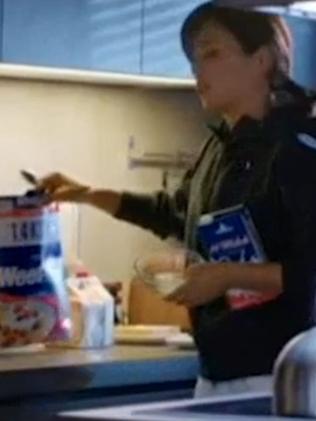Why China has gone nuts for Weet-Bix
AN ICONIC Australian brand has hit the jackpot in the most surprising place - China. And it’s unveiling a huge expansion.

IN a line-up of Aussie breakfast favourite Weet-Bix’s past brand ambassadors, the iconic brand’s latest marketing recruit would stick out like a sore thumb.
She doesn’t have the sporting prowess of the heroes that past Weet-Bix kids have idolised and followed in their breakfast choices, and she’d be hard-pressed to down the seven dense cakes of shredded wheat that cricketer Brett Lee claimed to consume each morning during his time as a face of the brand, or football superstar Tim Cahill’s nine.
The latest face of the product is Taiwanese-Chinese reality TV star and “supermum” Alyssa Chia.
Though she’ll be unrecognisable to most of Weet-Bix’s traditional target market — Aussies kids — Ms Chia’s association with the brand is part of Sanitarium’s newly announced massive expansion into the Chinese market, and part of the reason China is going crazy for Weet-Bix.
Sanitarium has been selling its products, including the Aussie breakfast classic Weet-Bix, into China for the past eight years but it’s only in the past two to three years they’ve really started focusing on the market. Today Sanitarium announced a huge Chinese expansion strategy as it focus on the recent surge in Chinese demand for cereals, for which the brand is partly responsible.
Earlier this year, a tip from a local distributor led to the single most profitable move the food company has made in its international strategy.
It was a product placement in a popular Chinese drama program called Ode to Joy, and the reaction sent sales through the roof.
When one of the drama’s lead characters expressed their love for the flaky wheat cakes on the program during an episode that aired in May, demand shot up in a way Sanitarium had never anticipated.
“It probably caught us a little bit on the hop,” Sanitarium’s international marketing manager Mark Roper told news.com.au.
“We literally got a spike in demand and we saw our financial year to June, our financial sales up over 50 per cent in China, and a lot of that was driven in the last quarter from that TV show. That demand has continued and we’re confident we will achieve a similar growth in the year ahead.”


The reaction to the introduction of Weet-Bix into Ode to Joy’s storyline was insane.
Sanitarium’s e-commerce channels were swamped by celebrity-obsessed Chinese customers. Stores that stocked the cereal in China were raided, and here in Australia, supermarket shelves were stripped of stock as private online sellers or daigou scrambled to ship the local product to Chinese customers with massive mark-ups.
Mr Roper said Sanitarium experienced a spike in demand across all of their channels.
“We got an increase in demand from every source. Our traditional bricks and mortar stores wanting more stock, our e-commerce channels were needing more and we had a lot of traders, a lot of daigou looking to get stock so we saw supermarket sales lift, basically demand was increased in all the different ways to sell products to China,” he said.
Although Weet-bix has had huge success from celebrity endorsements in the past, from test cricketers to reality TV stars (think Bachelor couple Sam and Snezana have signed on as brand ambassadors), the product’s appearance in front of an audience of more than 100 million on the popular Chinese TV program was beyond the scale of any marketing exercises they’d seen back home.
But Weet-Bix is hoping the success they had from the Ode to Joy product placement is only the beginning.
Through partnering with Ms Chia, the brand plans to harness the star’s millions of social media followers and fans of her reality TV show.
Ms Chia, 42, is a mother to two (with a third on the way), who has established an image as a super healthy “supermum”.
On the reality TV show that tracks her and her family’s daily life, she’s portrayed as a very fit, nutrition-focused, healthy parent. It’s sort of like what you might imagine happening if Michelle Bridges starred a Kardashian-style reality show.
Sanitarium, and other Australian and New Zealand health food brands like Manuka Health and Thursday Plantation, have latched on to the Chinese megastar’s influence and recruited her as the Chinese face of their products.
At an exclusive event in Sydney on Tuesday, Ms Chia told a crowd of Australian health food industry folk and local daigou about her enthusiasm for the deal, as they rubbed their hands together anticipating the demand her endorsement would create for Australian products.
She told the crowd, through a translator, that Australian products had a reputation of being very nutritious and safe, and that she would enthusiastically promote the brands that had brought her on board.

Also at the event, Sanitarium’s General Manager Todd Saunders hinted the company had only just begun its takeover of the Chinese market.
To comply with strict branding restrictions being introduced in China, Sanitarium has announced the launch of its international product, Nutri-Brex, to be marketed in China. It’s only different in name, and so Sanitarium expects its sales will follow the success they’ve had with the existing product.
“Different to the iconic Weet-Bix product in name only, Nutri-Brex is made in the same factories, using the same ingredients and the same traditional recipe that Sanitarium has used for almost 90 years. It’s the same name that we use for Weet-Bix in the UK, our second biggest export market,” he said.
“Despite the recent success we’ve enjoyed, it is still relatively early days for Sanitarium in China. Data suggests about 15 per cent of Chinese households make a regular breakfast cereal purchase, compared to 90 per cent of Australian households. That’s why the timing to change brand names while Chinese consumer awareness of Weet-Bix is at its highest actually works.”
Nutri-Brex will be heavily marketed in more than 1500 stores across China and through online sales, focusing on Ali Baba’s massive TMall platform which currently accounts for more than half of sales of Sanitarium’s products in China.
It’s one of the latest brands to take advantage of Australia’s good reputation for producing quality, safe, food and other goods, and popularity among the hugely profitable Chinese market.
Speaking at the Sydney event, Ali Baba’s John O’Loghlen said Australian companies were among the biggest exporters to China via the popular e-commerce platform. He said it was partly thanks to the Australia’s lifestyle and reputation for quality products.
“In Australia and New Zealand this is a very unique phenomenon we don’t see (in other countries),” he said.
“Australia and New Zealand is a top five ranking across all the platforms in the Ali Baba group, even ahead of all the countries in Europe.
“These brands that have borne out of the society and the lifestyle and the great entrepreneurial spirit and the companies down here, they are very very very prominent vis a vis other markets.”





